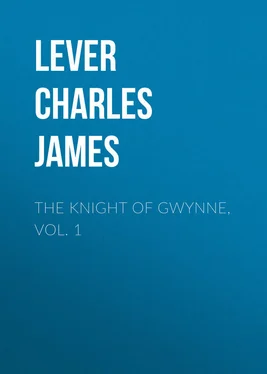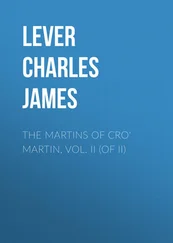Charles Lever - The Knight Of Gwynne, Vol. 1
Здесь есть возможность читать онлайн «Charles Lever - The Knight Of Gwynne, Vol. 1» — ознакомительный отрывок электронной книги совершенно бесплатно, а после прочтения отрывка купить полную версию. В некоторых случаях можно слушать аудио, скачать через торрент в формате fb2 и присутствует краткое содержание. Жанр: foreign_antique, foreign_prose, на английском языке. Описание произведения, (предисловие) а так же отзывы посетителей доступны на портале библиотеки ЛибКат.
- Название:The Knight Of Gwynne, Vol. 1
- Автор:
- Жанр:
- Год:неизвестен
- ISBN:нет данных
- Рейтинг книги:3 / 5. Голосов: 1
-
Избранное:Добавить в избранное
- Отзывы:
-
Ваша оценка:
- 60
- 1
- 2
- 3
- 4
- 5
The Knight Of Gwynne, Vol. 1: краткое содержание, описание и аннотация
Предлагаем к чтению аннотацию, описание, краткое содержание или предисловие (зависит от того, что написал сам автор книги «The Knight Of Gwynne, Vol. 1»). Если вы не нашли необходимую информацию о книге — напишите в комментариях, мы постараемся отыскать её.
The Knight Of Gwynne, Vol. 1 — читать онлайн ознакомительный отрывок
Ниже представлен текст книги, разбитый по страницам. Система сохранения места последней прочитанной страницы, позволяет с удобством читать онлайн бесплатно книгу «The Knight Of Gwynne, Vol. 1», без необходимости каждый раз заново искать на чём Вы остановились. Поставьте закладку, и сможете в любой момент перейти на страницу, на которой закончили чтение.
Интервал:
Закладка:
“It’s an awfu’ thing,” observed Sandy, quaintly, “to see an auld carle, wi’ his twa legs in the grave, blaspheming that gate; but come awa’, tak’ your gimcracks, and let’s get back again, or, by the saul of my body, I ‘ll pit you in the fountain!”
Reasoning on that excellent principle of analogy, that what had happened might happen again even in a worse form, old Hickman unlocked the box and delivered into Sandy’s hands a black leather case, bearing as many signs of long years and service as his own.
“Let me walk I let me walk!” cried he, in a supplicating tone.
“Av you ca’ it walking,” said Sandy, grimly; “but it’s mair, far mair, like the step o’ a goose than a Christian man.”
What success might have attended Peter’s request it is difficult to say, for at this moment the noise of a horse was heard galloping up the avenue, and, immediately after, Mulville, the surgeon sent for by Mr. Daly, entered the courtyard. Without deigning a look towards Hickman, or paying even the slightest attention to his urgent demands for the restoration of his pocket-case, Sandy seized Mulville by the arm and hurried him away to the house.
The newly arrived doctor was an army surgeon, and proceeded, with all the readiness experience had taught him, to examine Forester’s wound; while Sandy, to save time, opened old Hickman’s case on the bed, and arranged the instruments.
“Look here, Mr. Daly,” said the doctor, as he drew some lint from the antiquated leather pocket, – “look here, and see how our old friend practises the art of medicine.” He took up, as he spoke, a roll of paper, and held it towards Daly: it was a packet of bill stamps of various value, for old Peter could never suffer himself to be taken short, and was always provided with the ready means of transacting money affairs with his patients.
“Here’s my d – d old bond,” said Daly, laughing, as he drew forth a much-crumpled and time-discolored parchment; “I’d venture to say the man would deserve well of his country who would throw this confounded pocket-book, and its whole contents, into that fire.”
“Ye maybe want some o’ the tools yet,” said Sandy, dryly, for, taking his master’s observations in the light of a command, he was about to commit the case and the paper to the flames.
“Take care! take care!” said Mulville, in a whisper; “it might be a felony.”
“It’s devilish little Sandy would care what name they would give it,” replied Daly; “he ‘d put the owner on the top of them, and burn all together, on a very brief hint;” then, lowering his voice, he added, “What’s his chance?”
“The chance of every young fellow of two or three-and-twenty to live through what would kill any man of my time of life. With good care and quiet, but quiet above all, he may rub through it. We must leave him now.”
“You ‘ll remain here,” said Daly; “you ‘ll not quit this, I hope?”
“For a day or two at least, I ‘ll not leave him.” And with this satisfactory assurance Daly closed the door, leaving Sandy on guard over the patient.
“Here’s your case of instruments, Hickman,” said Daly, as the old doctor sat motionless in his gig, awaiting their reappearance; for, in his dread of further violence, he had preferred thus patiently to await their return, than venture once more into the company of Sandy M’Grane. “We ‘ve robbed you of nothing except some lint; and,” added he in a whisper to Muiville, “I very much doubt if that case were ever opened and closed before with so slight an offence against the laws of property.”
Old Hickman by this time had opened the pocket-book, and was busily engaged inspecting its contents.
“Ay, that’s the bond!” said Daly, laughing; “you may well think how small the chance of repayment is, when I did not think it worth while burning it.”
“It will be paid in good time,” said Hickman, in a low cackle, “and the interest too, maybe – ay!” And with sundry admonitions from the whip, and successive chucks of the rein, the old pony threw up his head, shook his tail crossly, and, with a step almost as measured as that of his master, moved slowly out of the courtyard.
“So much for our century and our civilization!” said Daly, as he looked after him; “the old miser that goes there has more power over our country and its gentry than ever a feudal chief wielded in the days of vassalage.”
CHAPTER IX. “DALY’S.”
It was upon one of the very coldest evenings of the memorably severe January of 1800 that the doors of Daly’s Club House were besieged by carriages of every shape and description: some brilliant in all the lustre of a perfect equipage; others more plainly denoting the country gentleman or the professional man; and others, again, the chance occupants of the various coach-stands, displayed every variety of that now extinct family whose members went under the denominations of “whiskeys,” “jingles,” and “noddies.”
A heavy fall of sleet, accompanied with a cutting north wind, did not prevent the assemblage of a considerable crowd, who, by the strange sympathy of gregarious curiosity, were drawn up in front of the building, satisfied to think that something unusual, of what nature they knew not, was going forward within, and content to gaze on the brilliant glare of the lustres as seen through the drawn curtains, and mark the shadowy outlines of figures as they passed and repassed continually.
Leaving the mob, for it was in reality such, to speculate on the cause of this extraordinary gathering, we shall at once proceed up the ample stair and enter the great saloon of the Club, which, opening by eight windows upon College Green, formed the conversation-room of the members.
Here were now assembled between three and four hundred persons, gathered in groups and knots, and talking with all the eagerness some engrossing topic could suggest. In dress, air, and manner they seemed to represent sections of every social circle of the capital: some, in full Castle costume, had just escaped from the table of the Viceroy; others, in military uniform or the dress of the Club, contrasted with coats of country squires or the even more ungainly quaintness of the lawyers’ costume. They were of every age, from the young man emerging into life, to the old frequenter of the Club, who had occupied his own place and chair for half a century, and in manner and style as various, many preserving the courteous observances of the old school in all its polished urbanity, and the younger part of the company exhibiting the traits of a more independent, but certainly less graceful, politeness. Happily for the social enjoyments of the time, political leanings had not contributed their bitterness to private life, and men of opinions the most opposite, and party connections most antagonistic, were here met, willing to lay aside for a season the arms of encounter, or to use them with only the sportive pleasantry of a polished wit. If this manly spirit of mutual forbearance did not characterize the very last debates of the Irish Parliament, it may in a great measure be attributed to the nature of that influence by which the measure of the Union was carried; for bribery not only corrupted the venal, but it soured and irritated the men who rejected its seductions; and in this wise a difference was created between the two parties, wider and more irreconcilable than all which political animosity or mere party dislike could effect.
On the present occasion, however, the animating spirit of the assemblage seemed to partake of nothing less than a feature of political acrimony; and amid the chance phrases which met the ear, and the hearty bursts of laughter that every moment broke forth, it was easy to collect that no question of a party nature occupied their attention.
Читать дальшеИнтервал:
Закладка:
Похожие книги на «The Knight Of Gwynne, Vol. 1»
Представляем Вашему вниманию похожие книги на «The Knight Of Gwynne, Vol. 1» списком для выбора. Мы отобрали схожую по названию и смыслу литературу в надежде предоставить читателям больше вариантов отыскать новые, интересные, ещё непрочитанные произведения.
Обсуждение, отзывы о книге «The Knight Of Gwynne, Vol. 1» и просто собственные мнения читателей. Оставьте ваши комментарии, напишите, что Вы думаете о произведении, его смысле или главных героях. Укажите что конкретно понравилось, а что нет, и почему Вы так считаете.












